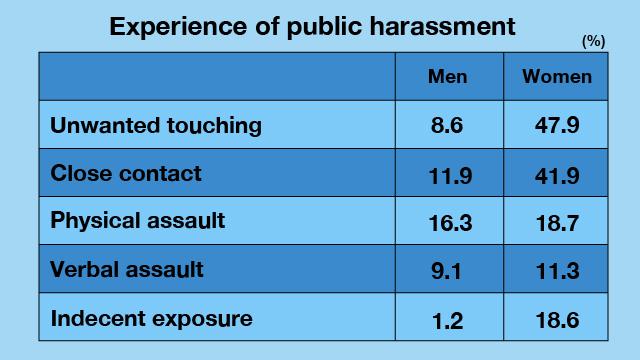Harassment in the headlines
The survey comes in the wake of several high-profile harassment issues that hit the headlines recently.
In April last year, a top bureaucrat at the finance ministry resigned following allegations that he had sexually harassed female reporters. And in December, a weekly magazine drew criticism for creating a list ranking female students at five universities in terms of sexual availability.
Japan’s take on #MeToo
The group behind the research is "WeToo Japan". Paying the bills via crowd funding, it used an online survey specialist to record around 12,000 answers from people between 15 and 49 living in and around Tokyo.
The survey asked about people's experience of harassment -- unwanted comments, being followed or touched and unwanted sexual advances. Groping on Japan's crowded public transport has long been an acknowledged issue.
Seventy percent of women and some 30 percent of men said they have experienced public harassment of some kind. More specifically, 48 percent of women and 9 percent of men reported being touched, while 42 percent of women and 12 percent of men said strangers had pressed their bodies against them suggestively. Just shy of 20 percent of female respondents reported strangers exposing themselves.
Non-sexual physical violence was also a clear issue. Nineteen percent of women said that they had been hit by someone, with a slightly lower 16 percent of men also having experienced assault.

Victim-blaming
Early in 2019, a poster made by a school uniform maker drew criticism. Alongside a cartoon of a schoolgirl in a skirt that fell just above the knee, the text read, "That short skirt you think is cute leads to sex crimes." The company withdrew the poster from schools and apologized for what looked like victim-blaming. It said it merely wanted to raise awareness of the issue.
The survey asked school-age girls about their experiences. Nearly half of girls required to wear a uniform said they have been touched inappropriately by a stranger, while about 10 percent have been on the receiving end of inappropriate comments in public. Among girls who don't wear uniforms, the figures were much lower, at 30 percent and 5 percent respectively.
Consent is everything
Sexual consent has only recently become a topic in Japan. In May last year, a student group made a handbook to highlight the issue and distributed it to universities in the Tokyo area.

And a video made by British police in 2015 has also been widely shared online in Japan. It explains consent in terms of whether or not it's appropriate to force someone to drink tea.
The survey asked 11,000 people over 20 what constitutes implied sexual consent, offering a range of scenarios from going for drinks with someone to kissing. Just one third of all respondents said that none of the situations necessarily implied consent.
On the other hand, over 60 percent of both men and women felt that kissing equated to consent, although more men than women expected sex after going out to eat or drink with a woman.

Clear need for change
One of the survey organizers, Chiki Ogiue, told a press conference: "Even though a majority believe something now, it doesn’t equate to consent.
"We would like to go forward with a discussion about the importance of sexual consent using our research on the present situation in Japan."
One alarming figure from the survey stood out -- just 10 percent of harassment victims said they had reported the matter to the police.
Overall, the results point to a low level of awareness in Japan of many issues surrounding harassment and related concerns. Any effort to start a public conversation must surely be welcomed.

